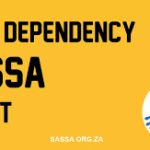
Raising a child with a permanent disability comes with unique emotional, physical, and financial challenges. The Care Dependency Grant is a financial relief program provided by the South African Social Security Agency (SASSA) to assist caregivers of children under the age of 18 who are medically certified as permanently disabled.
This article provides a detailed, easy-to-understand guide on everything you need to know about the Care Dependency Grant in 2025 from eligibility and application to the amount paid and how to maintain your grant.
What Is the Care Dependency Grant?
The Care Dependency Grant is a monthly financial aid provided by the government of South Africa to caregivers of children under 18 with permanent disabilities who require full-time care and support. It aims to ease the financial burden of providing constant care, medical attention, and daily assistance.
Unlike general child grants, this benefit is tailored specifically for children with serious, long-term disabilities.
🔗 Official SASSA Website: https://www.sassa.gov.za
Who Qualifies for the Care Dependency Grant?
To qualify, both the caregiver and the child must meet specific conditions set by SASSA.
Caregiver Requirements:
- Must be a South African citizen, permanent resident, or recognized refugee.
- Must reside in South Africa.
- Must be the primary caregiver of the child (this can include parents, grandparents, or legal guardians).
- Must pass the means test (unless applying on behalf of a foster child).
Child Requirements:
- Must be under 18 years old.
- Must be permanently disabled, as certified by a medical officer appointed by SASSA.
- Must not be cared for in a state institution such as a psychiatric facility or special needs home.
What Is the Means Test?
The means test is used to determine if a caregiver’s income is below a certain threshold, making them eligible for the grant.
Income Threshold for 2025:
- Single caregiver: Must earn less than R249,600 per year (R20,800 per month).
- Married couple: Combined income must be under R499,200 per year (R41,600 per month).
Note: If the child is a foster child, the means test does not apply.
How Much Is the Care Dependency Grant in 2025?
As of the latest update, the monthly payment for the Care Dependency Grant is:
- R2,090 per month per child
This amount is typically revised every year in line with inflation and government policy.
Comparison with Other Grants (2025):
| Grant Type | Monthly Amount |
|---|---|
| Child Support Grant | R530 (R780 with top-up) |
| Foster Child Grant | R1,180 |
| Care Dependency Grant | R2,090 |
How to Apply for the Care Dependency Grant
The grant application is done in person at your nearest SASSA office. Here’s how to go about it.
Documents Needed:
- Your South African ID (or refugee status permit)
- Child’s birth certificate
- Medical assessment report from a SASSA-approved doctor
- Proof of income (e.g., payslips or bank statements)
- Proof of address
- Bank account details (optional, for payment into your account)
If you are not the biological parent, additional documents may be required, such as legal guardianship or adoption papers.

Application Process:
- Go to your nearest SASSA office.
- Request a Care Dependency Grant application form.
- Undergo a medical assessment from a designated medical practitioner.
- Submit all supporting documents.
- Receive a receipt or reference number.
SASSA will notify you of the outcome within 90 days. If approved, payments will be backdated to the date of application.
How Will You Receive the Grant?
You can choose one of the following payment methods:
- Bank deposit into your personal account
- SASSA Gold Card, usable at ATMs and retail stores
- Cash pay point (used in rural areas)
You can change your payment method later by visiting a SASSA office with your ID.
What If Your Application Is Denied?
If your application is unsuccessful, you will receive a written explanation. You have the right to appeal the decision.
Appeal Steps:
- File an appeal within 90 days of rejection.
- Submit your appeal to the Department of Social Development.
Responsibilities of the Caregiver
To keep receiving the Care Dependency Grant, caregivers must:
- Continue caring for the child full-time
- Renew medical assessments if requested
- Update SASSA if personal details, banking details, or living circumstances change
- Report the child’s death or placement into a government institution
Failure to do so may result in the suspension or cancellation of the grant.
When Does the Grant Stop?
The grant can be suspended or terminated under these circumstances:
- The child turns 18 (unless another grant becomes applicable).
- The child is placed in a state institution.
- The child passes away.
- The caregiver is no longer responsible for the child.
- Fraud or misrepresentation is discovered.
Can You Receive Other Grants Alongside the Care Dependency Grant?
Yes, it is possible to receive other social grants if you qualify, such as:
- Old Age Grant (for senior citizens)
- Foster Child Grant (if the child is also legally fostered)
- Disability Grant (after the child turns 18)
However, you cannot receive both the Care Dependency Grant and the Child Support Grant for the same child.
Useful Resources and Contacts
Here are helpful links and contact details for more information or assistance:
- SASSA Official Website:
https://www.sassa.gov.za - Check Your Grant Status:
https://srd.sassa.gov.za - Toll-Free Helpline:
0800 60 10 11 - WhatsApp Support:
082 046 8553
Final Thoughts
The Care Dependency Grant is an essential source of support for families caring for children with long-term disabilities. It provides much-needed financial relief and helps ensure that vulnerable children receive the care, love, and support they need.
If you are a caregiver of a child with a permanent disability and meet the requirements, don’t hesitate to apply. The process is straightforward, and the benefit can make a meaningful difference in your and your child’s life.
Pro Tip: Keep all documentation up-to-date and attend follow-up medical appointments when requested by SASSA.
Leave a Reply